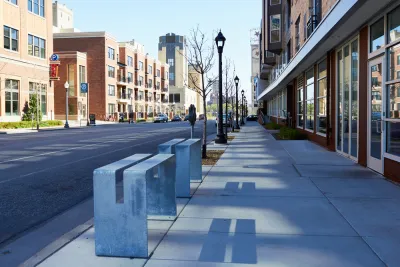The ability of the landmark Minneapolis 2040 plan, which adds density in various forms all over the city, to solve the cities climbing housing prices and growing lack of affordable housing, might have been exaggerated.

Jessica Lee revisits the Minneapolis 2040 Comprehensive Plan to ask key questions about how much the new plan, once it is implemented by the city, can be expected to address the growing housing affordability crisis in the city.
But first, Lee's summary of the Minneapolis 2040 plan, in case you missed it back when the plan was approved:
In December, the City Council approved its long-term plan for development, Minneapolis 2040, which made Minneapolis the first major U.S. city to eliminate single-family zoning all together. The move was celebrated by local residents who see increased density as key to the city’s housing inequalities while attracting the attention of the national media and housing-rights activists who think other metros should follow Minneapolis’ lead to increase residential density.
According to Lee, the plan raises one fundamental question: "If, or to what extent, will the elimination of single-family neighborhoods actually help with housing affordability in Minneapolis?"
As Lee notes, the plan envisions two basic changes to the planning regime in the city: allowing more residential density along transit corridors and eliminating single-family zoning to allow for up to three units on every residential parcel.
Lee finds experts and advocates who make the case that those efforts, and especially the elimination of single-family zoning, won't be enough to help low-income residents of the city.
Other reasons to question the comprehensive plan's ability to drastically alter the current affordability crisis, according to the article, is the long-term timeline that the plan, and any resulting zoning changes, will require to make a noticeable mark on the city. The timeline will be measured in decades, according to Lee.
FULL STORY: How much will Minneapolis’ 2040 plan actually help with housing affordability in the city?

Analysis: Cybertruck Fatality Rate Far Exceeds That of Ford Pinto
The Tesla Cybertruck was recalled seven times last year.

National Parks Layoffs Will Cause Communities to Lose Billions
Thousands of essential park workers were laid off this week, just before the busy spring break season.

Retro-silient?: America’s First “Eco-burb,” The Woodlands Turns 50
A master-planned community north of Houston offers lessons on green infrastructure and resilient design, but falls short of its founder’s lofty affordability and walkability goals.

Test News Post 1
This is a summary

Analysis: Cybertruck Fatality Rate Far Exceeds That of Ford Pinto
The Tesla Cybertruck was recalled seven times last year.

Test News Headline 46
Test for the image on the front page.
Urban Design for Planners 1: Software Tools
This six-course series explores essential urban design concepts using open source software and equips planners with the tools they need to participate fully in the urban design process.
Planning for Universal Design
Learn the tools for implementing Universal Design in planning regulations.
EMC Planning Group, Inc.
Planetizen
Planetizen
Mpact (formerly Rail~Volution)
Great Falls Development Authority, Inc.
HUDs Office of Policy Development and Research
NYU Wagner Graduate School of Public Service




























